法律英语合同法
法律英语课件-CONTRACTLAW(2017年)合同法
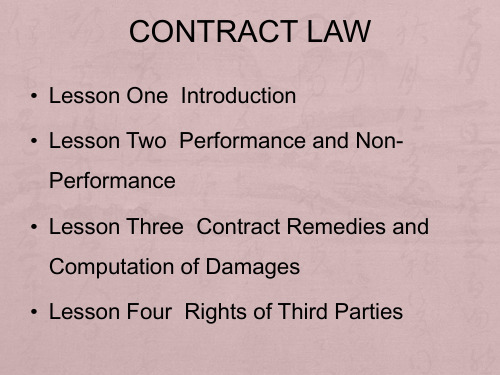
• 3.Necessary Elements of a Contract
• (1) There must be an agreement between the parties;
offeror by proper assent
Termination of Offer
Termination by Offeree • Rejection
– Not terminated by inquiries or request for different terms
• Counter-offer • Expiration set of promises where the law gives a remedy when breached, and the performance of which the law recognizes as a duty.
Contract law
• Contract law is most obviously the law relating to agreements or promises.
• The bulk of American contract law is judge-made case law.
• •
• The Uniform Commercial Code
• The Restatement of Contracts • 合同法注释汇编 • 合同法重述
• 2. Formation of Contract • offer and acceptance • Offeror and Offeree • Meeting of the minds • Mutual assent • Manifestation of willingness • “mirror image” • “mailbox rule”
法律英语知识点归纳
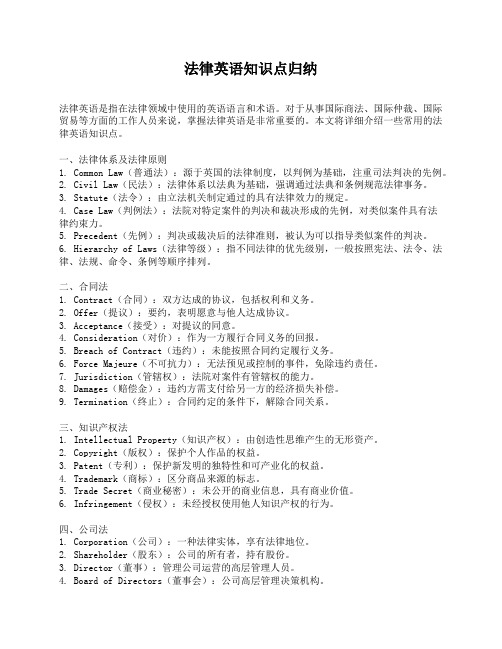
法律英语知识点归纳法律英语是指在法律领域中使用的英语语言和术语。
对于从事国际商法、国际仲裁、国际贸易等方面的工作人员来说,掌握法律英语是非常重要的。
本文将详细介绍一些常用的法律英语知识点。
一、法律体系及法律原则1. Common Law(普通法):源于英国的法律制度,以判例为基础,注重司法判决的先例。
2. Civil Law(民法):法律体系以法典为基础,强调通过法典和条例规范法律事务。
3. Statute(法令):由立法机关制定通过的具有法律效力的规定。
4. Case Law(判例法):法院对特定案件的判决和裁决形成的先例,对类似案件具有法律约束力。
5. Precedent(先例):判决或裁决后的法律准则,被认为可以指导类似案件的判决。
6. Hierarchy of Laws(法律等级):指不同法律的优先级别,一般按照宪法、法令、法律、法规、命令、条例等顺序排列。
二、合同法1. Contract(合同):双方达成的协议,包括权利和义务。
2. Offer(提议):要约,表明愿意与他人达成协议。
3. Acceptance(接受):对提议的同意。
4. Consideration(对价):作为一方履行合同义务的回报。
5. Breach of Contract(违约):未能按照合同约定履行义务。
6. Force Majeure(不可抗力):无法预见或控制的事件,免除违约责任。
7. Jurisdiction(管辖权):法院对案件有管辖权的能力。
8. Damages(赔偿金):违约方需支付给另一方的经济损失补偿。
9. Termination(终止):合同约定的条件下,解除合同关系。
三、知识产权法1. Intellectual Property(知识产权):由创造性思维产生的无形资产。
2. Copyright(版权):保护个人作品的权益。
3. Patent(专利):保护新发明的独特性和可产业化的权益。
4. Trademark(商标):区分商品来源的标志。
法律英语中合同的条款及规定

法律英语中合同的条款及规定Contracts are an essential part of legal English, as they establish the rights and obligations of the parties involved. 合同是法律英语中必不可少的一部分,因为它们确立了参与各方的权利和义务。
A contract typically includes various clauses and provisions that outline the terms of the agreement. 合同通常包括各种条款和规定,概述了协议的条款。
It is crucial for these clauses to be clear, precise, and legally sound to avoid potential disputes or misunderstandings. 这些条款必须清晰、精确和法律上健全,以避免潜在的纠纷或误解。
Both parties must fully understand the implications of the contract and willingly consent to its terms for it to be considered valid. 双方都必须充分理解合同的意义,并自愿同意其条款,才能被视为有效。
One of the most critical aspects of a contract is the inclusion of specific clauses that address potential issues and risks. 合同中最关键的方面之一是包括针对潜在问题和风险的具体条款。
These may include clauses related to breach of contract, dispute resolution, liability, indemnity, and termination. 这些可能包括与违约、争议解决、责任、赔偿和终止有关的条款。
法律英语词汇大全

法律英语词汇大全法律在现代社会中扮演着重要的角色,而法律英语作为一门专门的语言学科,具有其自身的特点和词汇体系。
本文将为您提供一份法律英语词汇大全,帮助您更好地理解和运用法律英语。
一、合同(Contracts)1. Offer(要约)- An expression of willingness to enter into a contractual agreement.2. Acceptance(接受)- The act of agreeing to the terms of an offer made by another party.3. Consideration(对价)- Something of value exchanged for the promise of another party in a contract.4. Breach(违约)- The failure to fulfill the terms of a contract withouta legitimate excuse.5. Termination(终止)- The ending or cancellation of a contract by the parties involved.6. Damages(损害赔偿)- The monetary compensation awarded to a party who suffers harm as a result of a breach of contract.7. Force Majeure(不可抗力)- An unforeseeable and uncontrollable event that prevents the fulfillment of contractual obligations.8. Assignment(转让)- The transfer of rights and obligations under a contract from one party to another.9. Non-performance(不履行义务)- The failure to fulfill contractual responsibilities.10. Confidentiality(保密性)- The requirement to keep certain information obtained during the course of a contract confidential.二、法院和司法程序(Courts and Judicial Procedures)1. Plaintiff(原告)- The party who initiates a lawsuit by filing a complaint in court.2. Defendant(被告)- The party against whom the lawsuit is filed and who must respond to the complaint.3. Trial(审判)- A formal legal proceeding in court in which evidence is presented and a decision is reached.4. Evidence(证据)- The information presented in court to support or refute a claim.5. Witness(证人)- A person who provides testimony under oath in court.6. Verdict(裁决)- The decision reached by the judge or jury in a trial.7. Appeal(上诉)- The process of asking a higher court to review and overturn a decision made by a lower court.8. Jurisdiction(管辖权)- The authority of a court to hear and decide a specific type of case.9. Subpoena(传票)- A legal document that requires a person to appear in court or produce evidence.10. Contempt of Court(蔑视法庭)- Behavior that disrespects or obstructs the functioning of a court, punishable by fines or imprisonment.三、知识产权(Intellectual Property)1. Patent(专利)- An exclusive right granted to an inventor to protect their invention from being used, made, or sold by others.2. Trademark(商标)- A distinctive sign or symbol that identifies and distinguishes the goods or services of one party from those of others.3. Copyright(版权)- The exclusive rights granted to authors, artists, and other creators to protect their original works.4. Infringement(侵权)- The unauthorized use or reproduction of intellectual property protected by law.5. Licensing(许可证)- The process of granting permission to use intellectual property to another party.6. Trade Secret(商业秘密)- Confidential information that provides a competitive advantage to its owner and is protected from disclosure.7. Royalties(专利权使用费)- Payments made to the owner of intellectual property for the use or sale of their rights.8. Fair Use(合理使用)- The limited use of copyrighted material without the permission of the copyright holder, typically for purposes such as criticism, commentary, or education.9. Anti-counterfeiting(反盗版)- Measures taken to prevent the unauthorized production, distribution, and sale of counterfeit goods.10. Infringement Notice(侵权通知)- A formal notice sent to an alleged infringer of intellectual property rights, demanding that they cease their infringing activities.这份法律英语词汇大全涵盖了合同、法院和司法程序以及知识产权等方面的关键词汇,能够帮助您更好地理解和运用法律英语。
何家弘 法律英语 第九章 合同法

何家弘法律英语第九章合同法全文共3篇示例,供读者参考篇1Chapter Nine of He Jiahong's book "Legal English" discusses contract law. In this chapter, the author examines the principles of contract law in both common law and civil law jurisdictions, as well as the key elements of a contract, including offer, acceptance, consideration, intention to create legal relations, and capacity.One of the main topics covered in this chapter is the different types of contracts, including bilateral contracts, unilateral contracts, and contracts under seal. In addition, the author explores the concept of implied contracts and the distinction between formal and informal contracts.He Jiahong also discusses the formation of contracts, including the importance of offer and acceptance in creating a legally binding agreement. The author explains how an offer can be terminated, revoked, or rejected, and the requirements for acceptance to be valid.Another important aspect of contract law that is examined in this chapter is the doctrine of consideration. He Jiahong explains the significance of consideration in contract formation and the rules regarding adequacy of consideration and past consideration.Furthermore, the author delves into the principles of intention to create legal relations and capacity in contract law. He explains how parties must have the intention to be legally bound by the terms of a contract for it to be enforceable, and the rules regarding minors, intoxicated persons, and mentally incapacitated individuals entering into contracts.Overall, Chapter Nine of "Legal English" by He Jiahong provides a comprehensive overview of contract law principles and key concepts. By examining the various aspects of contract formation, the author offers a thorough understanding of the legal framework that governs contractual relationships in both common law and civil law systems.篇2Title: Chapter Nine of He Jiahong's "Legal English: Contract Law"Chapter Nine of He Jiahong's "Legal English: Contract Law" delves into the intricate details of contract law and provides a comprehensive overview of the key concepts and principles governing contractual relationships. This chapter examines the formation, interpretation, and enforcement of contracts, as well as the rights and obligations of the parties involved.One of the central themes of this chapter is the concept of offer and acceptance, which is essential for the formation of a valid contract. According to He Jiahong, an offer is a proposal by one party to enter into a contract on certain terms, while acceptance is the unconditional agreement to the terms of the offer. The chapter outlines the requirements for a valid offer and acceptance, including communication of the offer and acceptance, intention to create legal relations, and certainty of terms.Moreover, He Jiahong discusses the importance of consideration in contract law, which refers to the exchange of something of value between the parties. He explains that consideration is necessary to make a contract legally binding and distinguishes it from a mere promise or gift. The chapter explores different types of consideration, such as goods, services,or money, and highlights the role of consideration in preventing gratuitous promises.Furthermore, this chapter addresses the issue of contractual interpretation, emphasizing the importance of interpreting contracts objectively and in accordance with the parties' intentions. He Jiahong explains that the courts will consider the language of the contract, the surrounding circumstances, and the parties' conduct to determine the meaning of the agreement. He also discusses the various rules of contractual interpretation, such as the contra proferentem rule and the parole evidence rule.In addition, He Jiahong examines the remedies available for breach of contract, including damages, specific performance, and injunctions. He explains that damages are the most common remedy for breach of contract and can be awarded to compensate the non-breaching party for any losses suffered as a result of the breach. The chapter also explores the principles governing the assessment of damages, such as remoteness, mitigation, and causation.Overall, Chapter Nine of He Jiahong's "Legal English: Contract Law" provides a comprehensive overview of the key principles and concepts of contract law. It offers valuable insightsinto the formation, interpretation, and enforcement of contracts, as well as the rights and obligations of the parties involved. This chapter serves as an essential resource for students, practitioners, and scholars seeking to deepen their understanding of contract law in a legal English context.篇3Chapter 9 Contract LawContract law is a fundamental part of the legal system in most countries around the world. The principles of contract law govern the relationships between parties entering into agreements, and are essential for regulating commerce and promoting fairness in business dealings. In this chapter, we will examine the key concepts and principles of contract law as outlined by legal scholar He Jiahong in his book on legal English.One of the fundamental principles of contract law is the concept of offer and acceptance. An offer is a promise by one party to do something in exchange for something from the other party, and acceptance is the agreement to the terms of the offer. For a contract to be legally binding, there must be a valid offer and acceptance between the parties involved. This principle iscrucial in determining whether a contract exists and what the terms of the contract are.Another important concept in contract law is consideration. Consideration is the exchange of something of value between the parties, such as money, goods, or services. In order for a contract to be enforceable, there must be consideration from both parties. This principle ensures that both parties are giving something of value in exchange for the promises made in the contract.The principle of intention to create legal relations is also essential in contract law. This principle states that the parties must have intended for their agreement to be legally binding. In commercial agreements, this intention is usually assumed. However, in other types of agreements, such as family agreements, the intention to create legal relations may not be present, and therefore the agreement may not be legally binding.One of the key components of contract law is the concept of capacity. Capacity refers to the legal ability of a party to enter into a contract. Minors, people of unsound mind, and those under the influence of drugs or alcohol may lack capacity toenter into a contract. In these cases, the contract may be voidable by the party lacking capacity.Contracts can also be classified into different types, such as bilateral and unilateral contracts. Bilateral contracts involve a promise from each party to the other, while unilateral contracts involve a promise from one party in exchange for an act from the other party. Understanding the different types of contracts is essential for interpreting and enforcing contract law.In conclusion, contract law is a complex and important area of legal study. Understanding the key concepts and principles of contract law is essential for anyone entering into business agreements or other contractual relationships. By following the guidelines outlined in this chapter, parties can ensure that their agreements are legally binding and enforceable.。
法律英语词汇大全
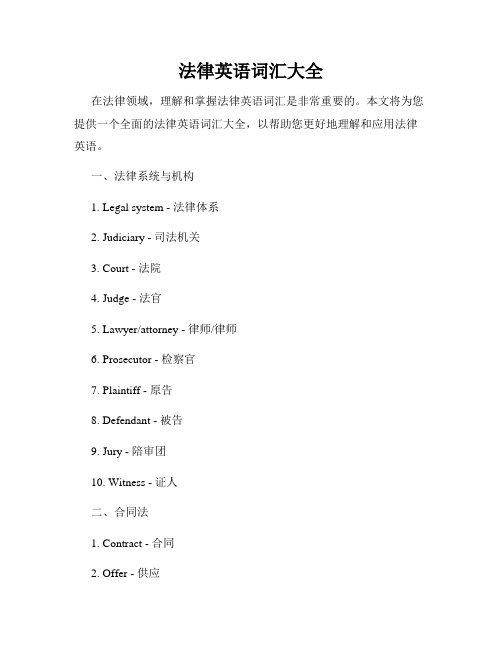
法律英语词汇大全在法律领域,理解和掌握法律英语词汇是非常重要的。
本文将为您提供一个全面的法律英语词汇大全,以帮助您更好地理解和应用法律英语。
一、法律系统与机构1. Legal system - 法律体系2. Judiciary - 司法机关3. Court - 法院4. Judge - 法官5. Lawyer/attorney - 律师/律师6. Prosecutor - 检察官7. Plaintiff - 原告8. Defendant - 被告9. Jury - 陪审团10. Witness - 证人二、合同法1. Contract - 合同2. Offer - 供应3. Acceptance - 接受4. Consideration - 对价5. Mutual assent - 相互同意6. Breach of contract - 违约7. Performance - 履行8. Termination - 终止9. Damages - 损害赔偿三、刑法1. Crime - 犯罪2. Offense - 违反3. Felony - 重罪4. Misdemeanor - 轻罪5. Homicide - 杀人罪6. Robbery - 抢劫罪7. Theft - 盗窃罪8. Assault - 袭击罪9. Burglary - 入室盗窃罪10. Arson - 纵火罪四、知识产权1. Intellectual property - 知识产权2. Patent - 专利3. Trademark - 商标4. Copyright - 版权5. Infringement - 侵权6. Royalties - 版权使用费五、公司法1. Corporation - 公司2. Shareholder - 股东3. Board of directors - 董事会4. Corporate governance - 公司治理5. Merger - 合并6. Acquisition - 收购7. IPO (Initial Public Offering) - 首次公开发行六、国际法1. International law - 国际法2. Treaty - 条约3. Diplomacy - 外交4. Sovereignty - 主权5. Human rights - 人权6. United Nations - 联合国7. World Trade Organization - 世界贸易组织七、家庭法1. Family law - 家庭法2. Divorce - 离婚3. Child custody - 子女抚养权4. Alimony - 赡养费5. Prenuptial agreement - 婚前协议6. Domestic violence - 家庭暴力八、地产法1. Property law - 房地产法2. Real estate - 房地产3. Landlord - 房东4. Tenant - 租户5. Lease agreement - 租赁协议6. Eviction - 驱逐九、金融法1. Financial law - 金融法2. Banking - 银行业3. Insurance - 保险4. Securities - 证券5. Insider trading - 内幕交易6. Money laundering - 洗钱十、法律程序1. Legal procedure - 法律程序2. Jurisdiction - 司法管辖权3. Due process - 正当程序4. Statute of limitations - 诉讼时效5. Appeal - 上诉6. Habeas corpus - 人身保护令总结:本文提供了一个全面的法律英语词汇大全,包含了法律体系与机构、合同法、刑法、知识产权、公司法、国际法、家庭法、地产法、金融法以及法律程序等方面的常用词汇。
LEC学习材料-合同法

合同法CONTRACTSIn law, a contract is a binding legal agreement that is enforceable in a court of law or by binding arbitration. That is to say, a contract is an exchange of promises with a specific remedy for breach. Agreement is said to be reached when an offer capable of immediate acceptance is met with a "mirror image" acceptance (i.e., an unqualified acceptance). The parties must have the necessary capacity to contract and the contract must not be either trifling, indeterminate, impossible, or illegal. Breach of contract is recognized by the law and remedies can be provided.As long as the good or service provided is legal, any oral agreement between two parties can constitute a binding legal contract. The practical limitation to this, however, is that only parties to a written agreement have material evidence (the written contract itself) to prove the actual terms uttered at the time the agreement was struck. In daily life, most contracts can be and are made orally, such as purchasing a book or a sandwich. Sometimes written contracts are required by either the parties, or by statutory law within various jurisdiction for certain types of agreement, for example when buying a house or land.Contract formationIn common-law systems, the five key requirements for the creation of a contract are:1. offer and acceptance (agreement)2. consideration3. an intention to create legal relations4. legal capacity5. formalitiesOffer and acceptance analysis is a traditional approach in contract law used to determine whether an agreement exists between two parties. As a contract is an agreement, an offer is an indication by one person (the "offeror") to another (the "offeree") of the offeror's willingness to enter into a contract on certain terms without further negotiations. A contract is said to come into existence when acceptance of an offer (agreement to the terms in it) has been communicated to the offeror by the offeree.Treitel defines an offer as "an expression of willingness to contract on certain terms, made with the intention that it shall become binding as soon as it is accepted by the person to whom it isaddressed", the "offeree". An offer is a statement of the terms on which the offeror is willing to be bound.The "expression" referred to in the definition may take different forms, such as a letter, newspaper, fax, email and even conduct, as long as it communicates the basis on which the offeror is prepared to contract.Whether two parties have an agreement or a valid offer is an issue which is determined by the court using the Objective test (Smith v. Hughes). Therefore the "intention" referred to in the definition is objectively judged by the courts. In the English case of Smith v. Hughes the court emphasised that the important thing is not a party's real intentions but how a reasonable person would view the situation. This is due mainly to common sense as each party would not wish to breach his side of the contract if it would make him or her culpable to damages, it would especially be contrary to the principle of certainty and clarity in commercial contract and the topic of mistake and how it affects the contract. As a minimum requirement the conditions for an offer should include at least the following 4 conditions: Delivery date, price, terms of payment that includes the date of payment and detail description of the item on offer including a fair description of the condition or type ofservice. Without one of the minimum requirements of condition an offer of sale is not seen as a legal offer but rather seen as an advertisement.Acceptance is a final and unqualified expression of assent to the terms of an offer. It is no defense to an action based on a contract for the defendant to claim that he had not intended to be bound by the agreement, if his conduct demonstrated that he had.Rules of acceptanceThere are several rules dealing with the communication of acceptance:•The acceptance must be communicated: see Powell v Lee (1908) Prior to acceptance, an offer may be withdrawn.•An exception exists in the case of unilateral contracts, in which the offeror makes an offer to the world which can be accepted by some act. A classic instance of this is the case ofCarlill v. Carbolic Smoke Ball Co. [1892] 2 Q.B. 484 in which an offer was made to pay £100 to anyone who having boughtthe offeror's product and used it in accordance with the instructions nonetheless contracted influenza. The plaintiff did so and the court ordered payment of the £100. Heractions accepted the offer - there was no need to communicate acceptance. Typical cases of unilateral offers are advertisements of rewards (e.g., for the return of a lost dog).•An offer can only be accepted by the offeree, that is, the person to whom the offer is made.•An offeree is not usually bound if another person accepts the offer on his behalf without his authorization, the exceptions to which are found in the law of agency, where an agent may have apparent or ostensible authority, or the usual authority of an agent in the particular market, even if the principal did not realize what the extent of this authority was, and someone on whose behalf an offer has been purportedly accepted it may also ratify the contract within a reasonable time, binding both parties.•It may be implied from the construction of the contract that the offeror has dispensed with the requirement of communication of acceptance (called waiver of communication - which is generally implied in unilateral contracts): see also Re Selectmove Ltd [1994] BCC 349.•If the offer specifies a method of acceptance (such as by post or fax), acceptance must be by a method that is no lesseffective from the offeror's point of view than the method specified. The exact method prescribed may have to be used in some cases but probably only where the offeror has used very explicit words such as "by registered post, and by that method only": see Yates Building Co. Ltd v. R.J. Pulleyn & Sons (York) Ltd (1975) 119 Sol. Jo. 370.•Silence cannot be construed as acceptance: see Felthouse v.Bindley (1862) 142 ER 1037.•However, acceptance may be inferred from conduct.Vitiating FactorsThere are the factors affecting the validity of an otherwise effective contract. They include mistakes, misrepresentation, duress, undue influence and illegality.DischargeOnce it is determined that a party is under an immediate duty to perform, the duty to perform must be discharged. A contract may be discharged in one of the following ways:·By performance·By tender of performance·By frustration·By operation of law·By occurrence of condition subsequent·By illegality·By rescission·By novation·By cancellation·By release·By substituted contract·By accord and satisfaction·By account stated·By lapse·By effect of running of statute of limitationsBreach of contract is a legal concept in which a binding agreement or bargained-for exchange is not honored by one or more of the parties to the contract by non-performance orinterference with the other party's performance. If the party does not fulfill his contractual promise, or has given information to the other party that he will not perform his duty as mentioned in the contract or if by his action and conduct he seems to be unable to perform the contract, he is said to breach the contract.Remedies for Breach of Contract•Damages, which may include:o Compensatory damageso Punitive damageso Incidental damageso Liquidated damageso Nominal damages•Coercive reliefo Specific performanceo Injunctionso Restitutiono Account of profits【版权声明】《合同法CONTRACTS》的版权属于法律英语证书(LEC)全国统一考试委员会所有。
【法律英语】合同法 一般规定(英文)
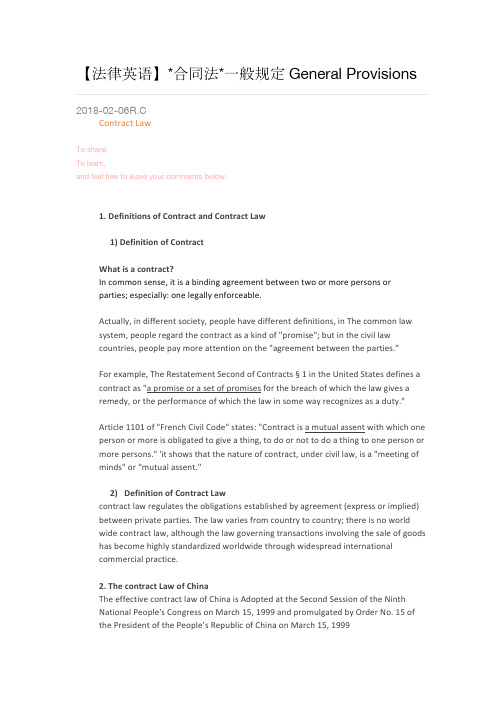
[B]Article 2 A contract in this Law refers to an agreement amongnatural persons, legal persons or other organizations as equal parties for the establishment, modification, termination of a relationship involving the civil rights and obligations of such entities. Agreements concerning personal relationships such as marriage, adoption, guardianship, etc. shall be governed by the provisions in other laws.
法律英语词汇:17个法律术语
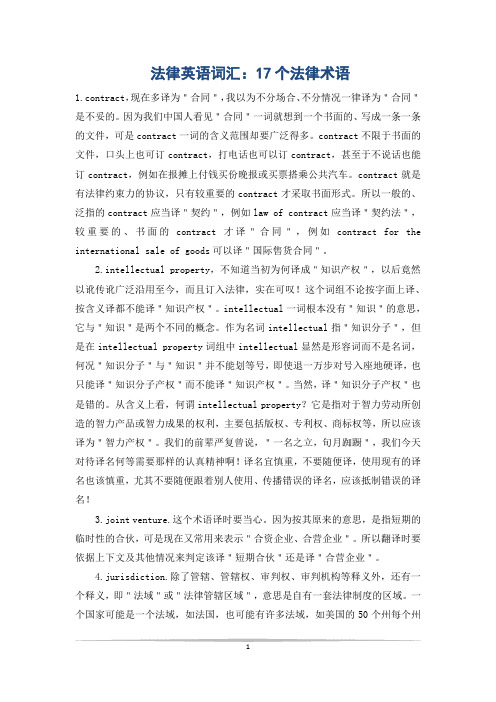
法律英语词汇:17个法律术语1.contract,现在多译为"合同",我以为不分场合、不分情况一律译为"合同"是不妥的。
因为我们中国人看见"合同"一词就想到一个书面的、写成一条一条的文件,可是contract一词的含义范围却要广泛得多。
contract不限于书面的文件,口头上也可订contract,打电话也可以订contract,甚至于不说话也能订contract,例如在报摊上付钱买份晚报或买票搭乘公共汽车。
contract就是有法律约束力的协议,只有较重要的contract才采取书面形式。
所以一般的、泛指的contract应当译"契约",例如law of contract应当译"契约法",较重要的、书面的contract才译"合同",例如contract for the international sale of goods可以译"国际售货合同"。
2.intellectual property,不知道当初为何译成"知识产权",以后竟然以讹传讹广泛沿用至今,而且订入法律,实在可叹!这个词组不论按字面上译、按含义译都不能译"知识产权"。
intellectual一词根本没有"知识"的意思,它与"知识"是两个不同的概念。
作为名词intellectual指"知识分子",但是在intellectual property词组中intellectual显然是形容词而不是名词,何况"知识分子"与"知识"并不能划等号,即使退一万步对号入座地硬译,也只能译"知识分子产权"而不能译"知识产权"。
当然,译"知识分子产权"也是错的。
从含义上看,何谓intellectual property?它是指对于智力劳动所创造的智力产品或智力成果的权利,主要包括版权、专利权、商标权等,所以应该译为"智力产权"。
我们的前辈严复曾说,"一名之立,旬月踟蹰",我们今天对待译名何等需要那样的认真精神啊!译名宜慎重,不要随便译,使用现有的译名也该慎重,尤其不要随便跟着别人使用、传播错误的译名,应该抵制错误的译名!3.joint venture.这个术语译时要当心。
法律英语合同范本(汇总6篇)

法律英语合同范本(汇总6篇)(经典版)编制人:__________________审核人:__________________审批人:__________________编制单位:__________________编制时间:____年____月____日序言下载提示:该文档是本店铺精心编制而成的,希望大家下载后,能够帮助大家解决实际问题。
文档下载后可定制修改,请根据实际需要进行调整和使用,谢谢!并且,本店铺为大家提供各种类型的经典范文,如工作总结、工作计划、合同协议、条据书信、讲话致辞、规章制度、策划方案、句子大全、教学资料、其他范文等等,想了解不同范文格式和写法,敬请关注!Download tips: This document is carefully compiled by this editor. I hope that after you download it, it can help you solve practical problems. The document can be customized and modified after downloading, please adjust and use it according to actual needs, thank you!Moreover, our store provides various types of classic sample texts for everyone, such as work summaries, work plans, contract agreements, document letters, speeches, rules and regulations, planning plans, sentence summaries, teaching materials, other sample texts, etc. If you want to learn about different sample formats and writing methods, please pay attention!法律英语合同范本(汇总6篇)法律英语合同范本第1篇•Party 合同当事方•Made /entered 订立合同•By and between/among 在…之间•Under the law of 依照…法律•domicile住所地•place of business营业地•legal address 法定住址•principal office 主营业所(或公司总部)•registered office 注册地•Whereas 鉴于•Agree as follows 同意缔约如下•arising from 产生于•in connection with 与…有关•friendly negotiation 友好协商•submitted to 提交至•in accordance with 根据•Arbitration Rules and the Procedure 仲裁规则和程序•final and binding 终局的和有约束力的•shall be borne 由…承担•the losing party 败诉方•fulfill the arbitration award 履行仲裁裁决•continuously eXecuted 继续履行公司类AOA:Article of Association公司章程AOI: Article of Incorporation组织章程Company Constitution公司章程Bylaws公司章程或规章制度,Charter公司的宪章性·文件BR: Broad Resolution决议Minutes会议的记录Business plan 商业计划书交易类Letter of Inquiry 询价函PO purchase order 订单Pro Forma Invoice 形式发票Bill of lading 提单Letter of credit 信用证Power of attorney 授权委托书Bill of lading:提单•Shipper:托运人•Carrier:承运人•Consignee:收货人•Notify party:通知方•Forward Agent:货代•Port of loading:装运港•Port of discharge:卸货港•Clean BoL: 清洁提单Letter of Credit:信用证•In one’s favor:以…为受益人•Sight draft:见单即付•Bills of lading:提单•Marine risk:海商法•Commercial invoice:商业发票•Present:交单•UCP:跟单信用证统一惯例•ICC:国际商会Purchase order:PO 订单•In accordance with:与…一致•With the following terms:按照下列条款•Delivery Date :交货期•Priorto:在…之前•Confirmed:经保兑的•Irrevocable letter of credit:不可撤销信用证•Acknowledgment 确认函Pro Forma Invoice:形式发票•Description:规格•Price Per Unit:单价•Total Price: 总价•Ocean Freight: 海洋运输•The prices quoted: 报价•Payment terms:付款条款•Subject to: 取决于/决定于合同阅读:《鏖战英文合同》王相国《法律英语阅读与翻译教·程》屈文生、石伟《英文合同入门指南》乔焕然词汇书籍:《法律英语核心词汇速记手册》《英汉国际经济法律词汇》《英汉汉英法律用语辩证词典》《法律英语核心术语:实务基础》词典推荐:韦氏法律词典,满足一般的合同、协议法律文件翻译元照英美法词典,中英文,非常适合初学者法律英语合同范本第2篇英语写作(不仅仅是法律英语写作)一共可能传达六种信息:who,when,where,what,how,why.如果你试图在一个句子里把这六种信息同时都传达出来,很可能最后会写出几十个单词的恼人的长句子。
很全的一版法律英语词汇
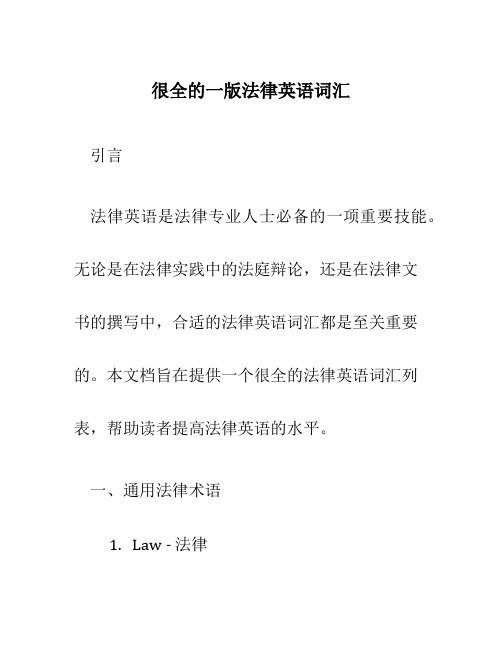
很全的一版法律英语词汇引言法律英语是法律专业人士必备的一项重要技能。
无论是在法律实践中的法庭辩论,还是在法律文书的撰写中,合适的法律英语词汇都是至关重要的。
本文档旨在提供一个很全的法律英语词汇列表,帮助读者提高法律英语的水平。
一、通用法律术语w - 法律2.Legislation - 法规3.Statute - 法令4.Regulation - 规章5.Act - 法案6.Case - 案例7.Jurisdiction - 管辖权8.Court - 法院9.Judge - 法官10.A ttorney - 律师11.D efendant - 被告12.P lntiff - 原告13.W itness - 证人14.E vidence - 证据15.V erdict - 裁决二、合同法1.Contract - 合同2.Offer - 出价3.Acceptance - 接受4.Consideration - 对价5.Breach - 违约6.Performance - 履行7.Damages - 损害赔偿8.Termination - 终止9.Agreement - 协议10.C ounteroffer -还盘三、刑法1.Crime - 犯罪2.Offense - 违法行为3.Murder - 谋杀4.Robbery - 抢劫5.Theft - 盗窃6.Assault - 袭击7.Fraud - 欺诈8.Sentence - 判决9.Conviction - 定罪10.G uilty - 有罪11.I nnocent - 无罪四、知识产权法1.Copyright - 版权2.Trademark - 商标3.Patent - 专利4.Infringement - 侵权5.Intellectual Property - 知识产权6.License - 许可证7.Royalty - 版税8.Invention - 发明9.Trade Secret - 商业秘密10.F r Use - 合理使用五、公司法pany - 公司2.Shareholder - 股东3.Director - 董事4.Merger - 合并5.Acquisition - 收购6.Incorporation - 注册成立7.Bylaws - 法规章程8.Share - 股份9.Dividend - 红利10.B oard of Directors - 董事会六、劳动法1.Employment - 就业2.Employee - 员工3.Employer - 雇主4.Discrimination - 歧视5.Overtime - 加班6.Termination - 解雇7.Retaliation - 报复8.Worker’s Compensation - 工伤赔偿9.Collective Bargning - 集体协商10.M inimum Wage - 最低工资结论以上展示了一个很全的法律英语词汇列表,覆盖了通用法律术语以及一些常见的法律领域术语。
法律英语合同法高频词汇

法律英语合同法高频词汇Legal English Vocabulary for Contract Law.Contract law, being a crucial aspect of legal practice, is rich in terminology and jargon. This article aims to provide an overview of some of the high-frequency vocabulary used in the field of contract law, focusing on legal English terminology.1. Contract.A binding agreement between two or more parties that is enforceable by law.2. Party.An individual or entity involved in a contract.3. Offer.A proposal made by one party to another, stating their willingness to enter into a contract under certain terms.4. Acceptance.A positive response to an offer, indicating the willingness of the recipient to be bound by the terms of the contract.5. Consideration.Something valuable exchanged between the parties as a 诱因 or inducement to enter into the contract.6. Intention to Create Legal Relations.The intention of the parties to be bound by legally enforceable obligations.7. Capacity to Contract.The legal ability of a party to enter into a contract.This includes being of sound mind, having reached the ageof majority, and not being under any legal disqualification.8. Void Contract.A contract that is null and void from the outset, meaning it has no legal effect.9. Voidable Contract.A contract that can be annulled or set aside by one or more parties due to certain defects or irregularities.10. Breach of Contract.The failure of a party to perform their obligations under the contract.11. Damages.Compensation awarded to a party for losses suffereddue to a breach of contract.12. Force Majeure.An event or circumstance that is unforeseeable, unavoidable, and beyond the control of the parties, which prevents the performance of a contract.13. Fraud.Deceit or misrepresentation made by one party to another, inducing them to enter into a contract.14. Misrepresentation.A false statement of fact or law made by one party to another, either innocently, negligently, or fraudulently, which induces the other party to enter into a contract.15. Duress.The use of undue pressure or coercion by one party to induce another to enter into a contract.16. Unconscionable Contract.A contract that is so unfair or one-sided as to be considered unenforceable by law.17. Liquidated Damages.A pre-estimated amount of money agreed upon by the parties as compensation for a breach of contract, rather than calculating the actual losses suffered.18. Penalty Clause.A clause in a contract that imposes a punishment on a party for breaching the contract, which is intended to enforce the contract's terms.19. Breach of Warranty.The failure of a party to fulfill a warranty or guarantee made in the contract.20. Contractual Obligation.A duty or responsibility owed by a party to another under the terms of the contract.21. Performance.The fulfillment of the obligations set out in a contract by the parties.22. Termination of Contract.The ending of a contract either by agreement between the parties or due to a breach or other legal grounds.23. Third-Party Rights.Rights that arise in favor of a third party who is not a direct party to the contract but who is affected by its terms or performance.24. Assignment of Contract.The transfer of rights and obligations under a contract by one party to another party.25. Novation.The substitution of a new contract for an existing contract, with the consent of all parties.This list provides a snapshot of some of the key vocabulary used in contract law. However, it is important to note that contract law is a vast and complex field, and the vocabulary used can vary depending on the jurisdiction and the specific circumstances of each case. Therefore, it is always advisable to consult legal experts and professional legal resources when dealing with contract law matters.。
何家弘 法律英语 第九章 合同法 英汉对照
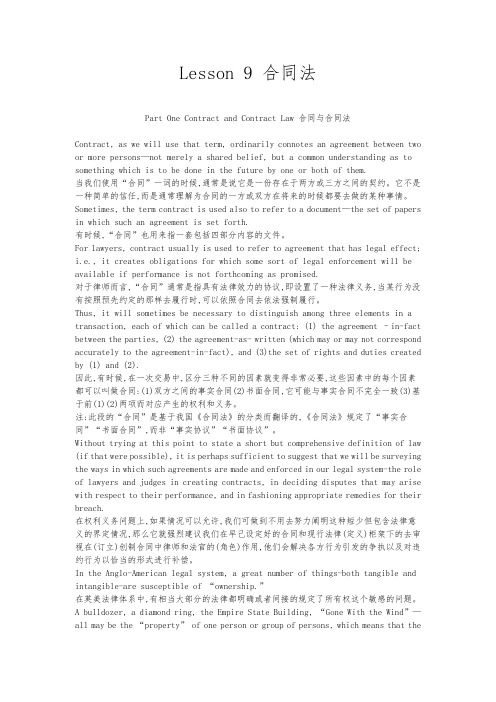
Lesson 9 合同法Part One Contract and Contract Law 合同与合同法Contract, as we will use that term, ordinarily connotes an agreement between two or more persons—not merely a shared belief, but a common understanding as to something which is to be done in the future by one or both of them.当我们使用“合同”一词的时候,通常是说它是一份存在于两方或三方之间的契约。
它不是一种简单的信任,而是通常理解为合同的一方或双方在将来的时候都要去做的某种事情。
Sometimes, the term contract is used also to refer to a document—the set of papers in which such an agreement is set forth.有时候,“合同”也用来指一套包括四部分内容的文件。
For lawyers, contract usually is used to refer to agreement that has legal effect;i.e., it creates obligations for which some sort of legal enforcement will be available if performance is not forthcoming as promised.对于律师而言,“合同”通常是指具有法律效力的协议,即设置了一种法律义务,当某行为没有按照预先约定的那样去履行时,可以依照合同去依法强制履行。
Thus, it will sometimes be necessary to distinguish among three elements in a transaction, each of which can be called a contract: (1) the agreement –in-fact between the parties, (2) the agreement-as- written (which may or may not correspond accurately to the agreement-in-fact), and (3)the set of rights and duties created by (1) and (2).因此,有时候,在一次交易中,区分三种不同的因素就变得非常必要,这些因素中的每个因素都可以叫做合同:(1)双方之间的事实合同(2)书面合同,它可能与事实合同不完全一致(3)基于前(1)(2)两项而对应产生的权利和义务。
法律英语词汇

法律英语词汇在当今全球化的时代,法律英语作为一种重要的专业英语,被广泛应用于国际法律交流和合作中。
因此了解和掌握一些常见的法律英语词汇是每位法律从业者的基本要求。
本文将从不同领域的法律英语词汇出发,为读者提供一份简要的参考。
一、合同法1. Contract - 合同2. Offer - 出价3. Acceptance - 接受4. Consideration - 对价5. Breach of contract - 违约6. Damages - 赔偿7. Termination - 终止8. Force majeure - 不可抗力9. Arbitration - 仲裁10. Jurisdiction - 管辖权二、刑法1. Crime - 犯罪2. Offense - 罪行3. Guilty - 有罪4. Innocent - 无辜5. Evidence - 证据6. Attorney - 律师7. Bail - 保释金8. Trial - 审判9. Verdict - 裁决10. Sentence - 判决三、知识产权法1. Copyright - 版权2. Patent - 专利3. Trademark - 商标4. Infringement - 侵权5. Royalties - 版权费6. Intellectual property - 知识产权7. Fair use - 合理使用8. Injunction - 禁令9. License - 许可10. Trade secret - 商业秘密四、劳动法1. Employee - 雇员2. Employer - 雇主3. Labor contract - 劳动合同4. Minimum wage - 最低工资5. Overtime pay - 加班费6. Discrimination - 歧视7. Harassment - 骚扰8. Unemployment benefits - 失业救济金9. Collective bargaining - 集体谈判10. Work injury compensation - 劳动争议五、国际法1. Treaty - 条约2. Diplomacy - 外交3. Sovereignty - 主权4. United Nations - 联合国5. International Court of Justice - 国际法庭6. Human rights - 人权7. Humanitarian law - 人道主义法律8. Peacekeeping - 维和9. Sanctions - 制裁10. War crime - 战争罪六、民事诉讼1. Plaintiff - 原告2. Defendant - 被告3. Complaint - 控诉4. Pleading - 辩词5. Judgment - 判决书6. Appeal - 上诉7. Discovery - 调查8. Subpoena - 传票9. Mediation - 调解10. Settlement - 和解总结:了解法律英语词汇不仅有助于提高法律专业的英语水平,也为国际法律领域的合作和交流提供了便利。
法律英语重点专业词汇表
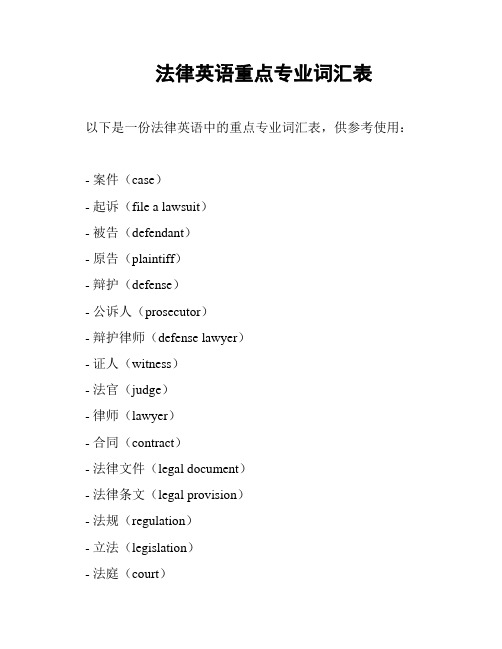
法律英语重点专业词汇表以下是一份法律英语中的重点专业词汇表,供参考使用:- 案件(case)- 起诉(file a lawsuit)- 被告(defendant)- 原告(plaintiff)- 辩护(defense)- 公诉人(prosecutor)- 辩护律师(defense lawyer)- 证人(witness)- 法官(judge)- 律师(lawyer)- 合同(contract)- 法律文件(legal document)- 法律条文(legal provision)- 法规(regulation)- 立法(legislation)- 法庭(court)- 诉讼(litigation)- 裁决(judgment)- 判决(verdict)- 上诉(appeal)- 不当行为(misconduct)- 违法行为(illegal act)- 犯罪行为(criminal act)- 合法(legal)- 非法(illegal)- 违反(violate)- 证据(evidence)- 调查(investigation)- 宪法(constitution)- 法治(rule of law)- 监管(regulation)- 法律系统(legal system)- 民事法(civil law)- 刑法(criminal law)- 劳动法(labor law)- 知识产权(intellectual property)- 合同法(contract law)- 诉讼程序(litigation process)这些词汇是法律英语学习中的重点,希望对您有所帮助。
请注意,在具体使用时,务必考虑上下文和专业背景,避免使用不正确或不当的法律术语。
(完整版)法律英语短语汇总大全

(完整版)法律英语短语汇总大全一、合同和协议- Agreement/Contract: 合同- Amendment: 修订- Breach of contract: 违约- Confidentiality clause: 保密条款- Force majeure: 不可抗力- Governing law: 管辖法律- Indemnification: 赔偿- Jurisdiction: 管辖区域- Liquidated damages: 违约金- Non-disclosure agreement: 保密协议- Termination clause: 终止条款- Validity: 有效性二、法律程序- Appellant: 上诉人- Bail: 保释- Defendant: 被告- Evidence: 证据- Hearing: 审理- Injunction: 禁令- Judgment: 判决- Legal counsel: 法律顾问- Plaintiffs: 原告- Trial: 审判- Verdict: 裁决- Witness: 证人三、知识产权- Copyright: 版权- Infringement: 侵权- Intellectual property: 知识产权- Patent: 专利- Trademark: 商标- Royalties: 版税- Trade secret: 商业秘密- Fair use doctrine: 合理使用原则- License agreement: 许可协议- Prior art: 先知技术- Utility model: 实用新型四、责任和赔偿- Negligence: 疏忽- Damages: 损害赔偿- Liability: 责任- Mitigation: 缓解- Tort: 侵权行为- Misrepresentation: 虚假陈述- Personal injury: 人身伤害- Strict liability: 严格责任- Breach of duty: 违反职责五、公司法和商法- Director: 董事- Shareholder: 股东- Merger and acquisition: 兼并收购- Partnership: 合伙企业- Proxy: 代理人- Articles of incorporation: 公司章程- Bylaws: 公司章程- IPO (Initial Public Offering): 首次公开发行- Stock option: 股票期权六、人权和公民权- Freedom of speech:- Equality: 平等- Discrimination: 歧视- Privacy: 隐私权- Human rights: 人权- Freedom of religion: 宗教自由- Right to vote: 选举权- Due process: 正当程序- Civil rights: 公民权利- Prohibition of torture: 禁止酷刑以上仅为一小部分法律英语短语,希望对您有帮助!以上是一份完整的法律英语短语汇总,包括合同和协议、法律程序、知识产权、责任和赔偿、公司法和商法以及人权和公民权等方面的常用词汇。
法律英语lec考试真题及解析
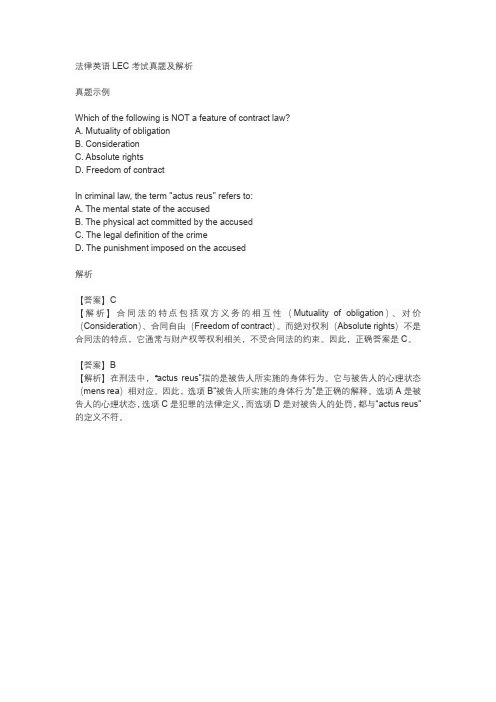
法律英语LEC考试真题及解析
真题示例
Which of the following is NOT a feature of contract law?
A. Mutuality of obligation
B. Consideration
C. Absolute rights
D. Freedom of contract
In criminal law, the term "actus reus" refers to:
A. The mental state of the accused
B. The physical act committed by the accused
C. The legal definition of the crime
D. The punishment imposed on the accused
解析
【答案】C
【解析】合同法的特点包括双方义务的相互性(Mutuality of obligation)、对价(Consideration)、合同自由(Freedom of contract)。
而绝对权利(Absolute rights)不是合同法的特点,它通常与财产权等权利相关,不受合同法的约束。
因此,正确答案是C。
【答案】B
【解析】在刑法中,“actus reus”指的是被告人所实施的身体行为。
它与被告人的心理状态(mens rea)相对应。
因此,选项B“被告人所实施的身体行为”是正确的解释。
选项A是被告人的心理状态,选项C是犯罪的法律定义,而选项D是对被告人的处罚,都与“actus reus”的定义不符。
法律英语词汇:17个法律术语
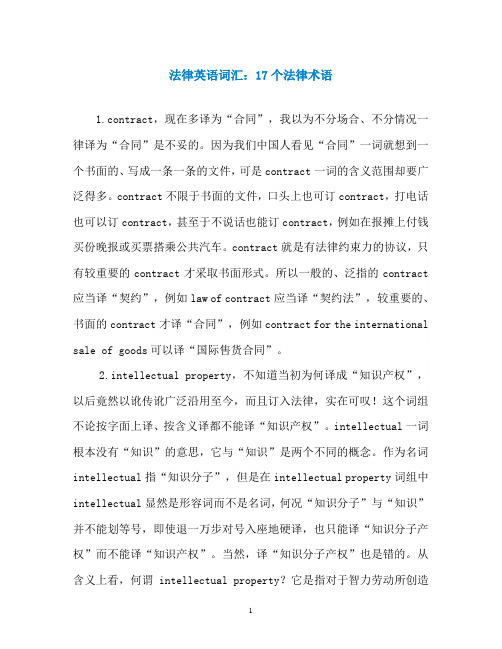
法律英语词汇:17个法律术语1.contract,现在多译为“合同”,我以为不分场合、不分情况一律译为“合同”是不妥的。
因为我们中国人看见“合同”一词就想到一个书面的、写成一条一条的文件,可是contract一词的含义范围却要广泛得多。
contract不限于书面的文件,口头上也可订contract,打电话也可以订contract,甚至于不说话也能订contract,例如在报摊上付钱买份晚报或买票搭乘公共汽车。
contract就是有法律约束力的协议,只有较重要的contract才采取书面形式。
所以一般的、泛指的contract 应当译“契约”,例如law of contract应当译“契约法”,较重要的、书面的contract才译“合同”,例如contract for the international sale of goods可以译“国际售货合同”。
2.intellectual property,不知道当初为何译成“知识产权”,以后竟然以讹传讹广泛沿用至今,而且订入法律,实在可叹!这个词组不论按字面上译、按含义译都不能译“知识产权”。
intellectual一词根本没有“知识”的意思,它与“知识”是两个不同的概念。
作为名词intellectual指“知识分子”,但是在intellectual property词组中intellectual显然是形容词而不是名词,何况“知识分子”与“知识”并不能划等号,即使退一万步对号入座地硬译,也只能译“知识分子产权”而不能译“知识产权”。
当然,译“知识分子产权”也是错的。
从含义上看,何谓intellectual property?它是指对于智力劳动所创造的智力产品或智力成果的权利,主要包括版权、专利权、商标权等,所以应该译为“智力产权”。
我们的前辈严复曾说,“一名之立,旬月踟蹰”,我们今天对待译名何等需要那样的认真精神啊!译名宜慎重,不要随便译,使用现有的译名也该慎重,尤其不要随便跟着别人使用、传播错误的译名,应该抵制错误的译名!3.joint venture.这个术语译时要当心。
- 1、下载文档前请自行甄别文档内容的完整性,平台不提供额外的编辑、内容补充、找答案等附加服务。
- 2、"仅部分预览"的文档,不可在线预览部分如存在完整性等问题,可反馈申请退款(可完整预览的文档不适用该条件!)。
- 3、如文档侵犯您的权益,请联系客服反馈,我们会尽快为您处理(人工客服工作时间:9:00-18:30)。
2020/5/4
法律英语
1
The web of the law
May not be quite seamless 法律之网可能并非结实无缝 They are not ironclad and unchanging 法律并非打不破和不可改变。
2020/5/4
法律英语
2
2020/5/4
法律英语
12
“ordinary” common law relief of damages
普通法规定的赔偿金救济
“extraordinary” equity remedy of specific performance 衡平法规定的特定履行救济
2020/5/4
法律英语
13
Contract —— an agreement between two or more persons.
If the agreement is broken, then the law provides certain remedies.
2020/5/4
法律英语
3
Three Factors
There are three factors necessary to create a contract:
2020/5/4
法律英语
4
Example of Contracts
Employment contracts Service Contracts
Insurance Contracts
Sale of Intangibles(stocks, bonds, patents, copyrights,etc)
2020/5/4
法律英语
11
Suppose that a vendor of house backs out on the deal. The vendee may sue for damages under common-law principles, but if he wants a court to force the seller to sell (specific performance) he uses principles developed in equity.
2020/5/4
法律英语
5
Background
Uniform Commercial Code Consumer Protection Statutes Labor Law Insurance Law
2020/5/4
涉及合同问题
法律英语
7
美国合同法
由法律保证执行 强制执行的限度
法律补救方法
1) an offer, 2) acceptance, and 3) consideration. One party makes an offer, the second party
must accept the offer and there must be consideration exchanged. Consideration has to be something of value.
Contract Definition
A contract is basically an agreement between two or more people which creates an obligation to do, or not do, something.
The agreement creates a legal relationship of rights and duties.
2020/5/4
Expectation damages
Agreed upon remedies
Equitable relief
法律英语
8
Special characteristics of equity law: relief in the form of specific performance
the injunction
the development of so called maxims of equity law
2020/5/4
法律英语
9
However, equitable relief regularly will lie only when the common law relief is inadequate.
2020/5/4
法律英语
10
For instance, specific performance for the purchase of real property will be granted because common law damages are deemed to be inadequate since they cannot compensate the buyer in view of the uniqueness attributed to real property.
Not merely a shared belief A common understanding as to something
2020/5/4
法律英语
14
Contract
Document The set of papers in which such
agreement is set forth. 文件——陈述契约的一系列文件。
2020/5/4
法律英语Βιβλιοθήκη 16Three elements in a transaction ——contract
1. The agreement-in-fact
2. The agreement-in-written
2020/5/4
法律英语
15
For lawyers
Contract ---- an agreement that has legal effect.
It creates obligations for which some sort of legal enforcement will be available if performance is not forthcoming as promised.
